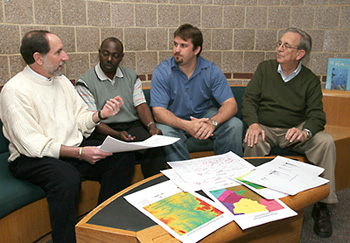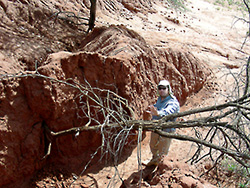Princeton University
Princeton Weekly Bulletin April 23, 2007, Vol. 96, No. 24 prev next current
- Page One
- • World premiere production of “Boris Godunov”
- • Deepening the discourse on racial dynamics
- Inside
- • Program will create community of humanities scholars
- • Researchers combine efforts to help people of African savannas manage their land
- • Revised plan unveiled for arts neighborhood
- • On a quest for ancient coins, Steiglitz finds inspiration for a book and a course
- • Communiversity set for April 28
- Almanac
- • Calendar of events
- • Nassau notes
- • By the numbers
- The Bulletin is published weekly during the academic year, except during University breaks and exam weeks, by the Office of Communications. Second class postage paid at Princeton. Postmaster: Send address changes to Princeton Weekly Bulletin, Office of Communications, Princeton University, 22 Chambers St., Suite 201, Princeton, NJ 08542. Permission is given to adapt, reprint or excerpt material from the Bulletin for use in other media.
- Subscriptions. The Bulletin is distributed free to faculty, staff and students. Others may subscribe to the Bulletin for $30 for the 2006-07 academic year (half price for current Princeton parents and people over 65). Send a check to Office of Communications, Princeton University, 22 Chambers St., Suite 201, Princeton, NJ 08542.
- Deadlines. In general, the copy deadline for each issue is the Friday 10 days in advance of the Monday cover date. The deadline for the Bulletin that covers May 7-20 is Friday, April 27. A complete publication schedule is available at www.princeton.edu/ pr/ pwb/ deadlines.html; or by calling (609) 258-3601.
- Editor: Ruth Stevens Calendar editor: Shani Hilton Staff writers: Jennifer Greenstein Altmann, Eric Quiñones Contributing writers: Emily Aronson, Karin Dienst, Hilary Parker, Ushma Patel, Teresa Riordan Photographers: Denise Applewhite, John Jameson Design: Maggie Westergaard Web edition: Mahlon Lovett
Researchers combine efforts to help people of African savannas manage their land
By Teresa Riordan
Princeton NJ — When an interdisciplinary research team from Princeton arrived in the savanna of central Kenya last summer, they found that one region they were planning to study — Koija — had not received any rainfall for 18 months.
“The smallest children were being fed gruel instead of milk because there was simply no milk to give them,” said Eva Kaye, a graduate student in politics.
The lack of water meant that there was little grassland upon which to graze the livestock that provide milk and meat and are the primary form of sustenance in the region.

Going over maps of the area where field research for the Water in Africa initiative is taking place are (from left): Daniel Rubenstein, chair of the Department of Ecology and Evolutionary Biology and lead investigator on the project; John Githaiga Maina, an eco-hydrologist who is a visiting researcher at Princeton this semester from the University of Nairobi; Trenton Franz, a graduate student in civil and environmental engineering; and Ignacio Rodriguez-Iturbe, the James S. McDonnell Distinguished University Professor of Civil and Environmental Engineering. (photo: Denise Applewhite)
Kaye is part of the Water in Africa initiative funded by the Princeton Institute for International and Regional Studies (PIIRS), which promotes interdisciplinary programs of global import. The Water in Africa initiative draws upon the expertise of researchers in the Department of Ecology and Evolutionary Biology, the School of Engineering and Applied Science and the Department of Politics.
“Water is what organizes all the players on this landscape,” said Daniel Rubenstein, chair of the Department of Ecology and Evolutionary Biology and director of the Program in African Studies, who is the lead investigator on the project. “The challenge is to bring the three sciences together so that they can generate insights that otherwise no one group would have had.”
Field research for the Water in Africa initiative is taking place in the Laikipia-Samburu region of central Kenya, where the Mpala Wildlife Foundation is located. The purpose, Rubenstein said, is to better understand the interplay of vegetation, climate, wildlife, livestock and humans on this remote section of the savanna so that the people who live there can develop an environmentally friendly and economically sustainable plan for managing their land.
“It is one of the very few projects that looks at an arid region from an interdisciplinary perspective,” said John Githaiga Maina, an eco-hydrologist who is a visiting researcher at Princeton this semester from the University of Nairobi and who is part of the Water in Africa team. “The project is also unusual in that it is interdisciplinary from beginning to end. We consult with each other every step of the way.”
As part of the initiative, Rubenstein and Ignacio Rodriguez-Iturbe, the James S. McDonnell Distinguished University Professor of Civil and Environmental Engineering, are teaching a seminar this spring on water in Africa. The class of 12 includes graduate students and seniors from disciplines across campus.
Although the class focuses specifically on water in a very small region in Kenya, the work the students are doing is widely applicable to many other regions. In a recent class, Daniel Stanton, a botany graduate student interested in a specialized discipline known as fog eco-hydrology, brought up Atacama, a rainforest in Chile where there is no rainfall but the forest thrives on moisture from fog. The class discussion also roamed to Niger (Rodriguez played a New York Times online video on the “re-greening of Niger”), Mongolia (where excessive grazing has caused dust storms that blow across Beijing) and Palestine (where backyard gardens play an important role in eco-hydrology).
While the class meets every Tuesday evening in Eno Hall, the real classroom for some of the seminar participants is the savanna itself.
Over winter break, Alex Lester and Trenton Franz, graduate students in civil and environmental engineering, joined Elizabeth King, a PIIRS postdoctoral fellow and semi-arid lands ecologist already in the field establishing baseline vegetation patterns. They installed water collection and sensing systems in four sites near Mpala. They also collected data from other sensing equipment they had installed last summer with Michael Celia, chair of the Department of Civil and Environmental Engineering and one of the researchers in the initiative. Data from the summer, as well as some number-crunching that Franz has performed on historical data in the region, informed a recent seminar discussion.

Graduate students Trenton Franz (shown in photo at right), and Alex Lester have installed water collection and sensing systems in several sites near Mpala. (photo: Alex Lester)
At the seminar, Rodriguez-Iturbe, a leading expert in the study of water, brought up the subject of climate change resulting from carbon emissions. The biggest challenges that humans will face from global warming, he said, are regional changes in precipitation.
Preliminary research from the engineers suggests that climate change is affecting the patterns of precipitation in the Mpala region, with rain falling more infrequently but with greater intensity — a pattern than can wreak havoc with the sustainability of grasslands.
“It is not enough to measure the mean change,” Rodriguez-Iturbe said. “The important change is in the dynamics of the rainfall.”
Of course, water dynamics are just one piece of the initiative.
How people of the region manage the grazing of their livestock is crucial if changes in precipitation patterns reduce available grasslands, which is what appears to be happening. Understanding how these changes also affect wildlife movements, especially those of the Grevy’s zebra — which compete for grazing land — will help shape conservation strategies.
Kaye, the politics graduate student, will return in June for a year to do research for her dissertation, gathering information about how communities make decisions about grazing. “The fundamental question I am exploring is: How do people try to coordinate themselves for the public good?” said Kaye, who works with Jennifer Widner, professor of politics and international affairs.
King, the postdoctoral researcher, has lived in Laikipia for five years and has been instrumental in creating community awareness and sensitization on the project by meeting with community members at gatherings known locally as “barazas.” She will return to Princeton late in the spring semester to join Maina in giving guest lectures in the course, helping students understand the importance of community participation. “We want to make sure this initiative is owned by the whole community,” Maina said. “They will become stakeholders in the whole project.”
In many ways, according to Rubenstein, this region of the savanna is replaying the well-known parable of the “tragedy of the commons,” in which finite communal resources are dissipated as individuals act in self-interest without an eye to how their actions affect the larger community. The ultimate goal of the Water in Africa initiative is to inform wise land stewardship for the region in the coming years.
“The knowledge we gain through the many aspects of this research will allow us to intercede and make meaningful changes for the future,” said Rubenstein.

